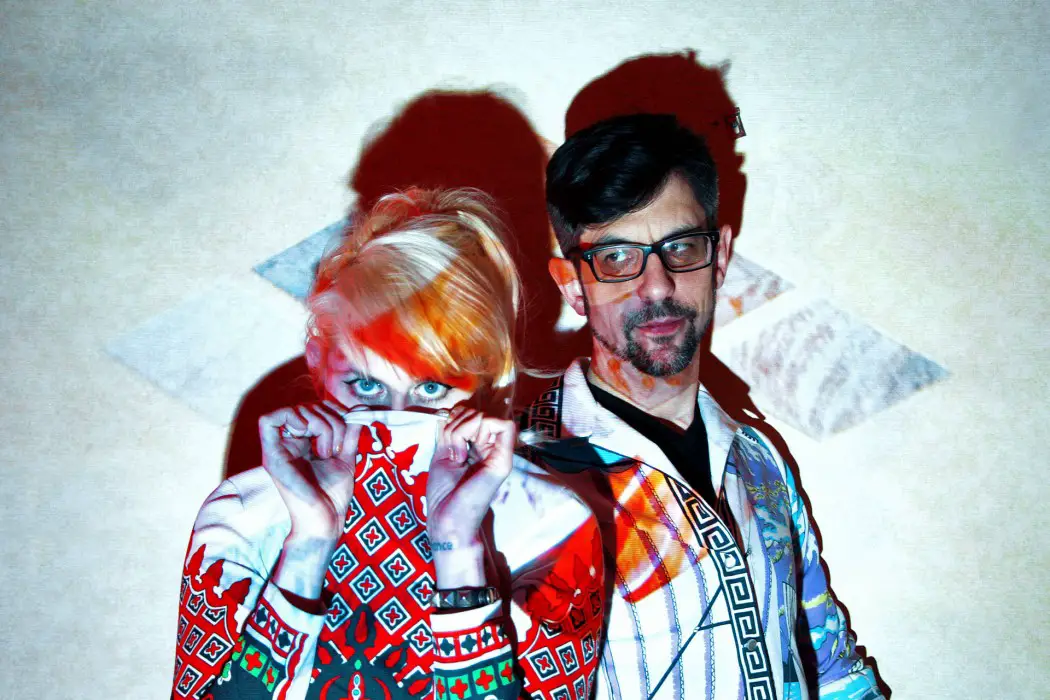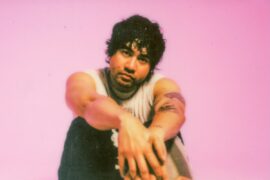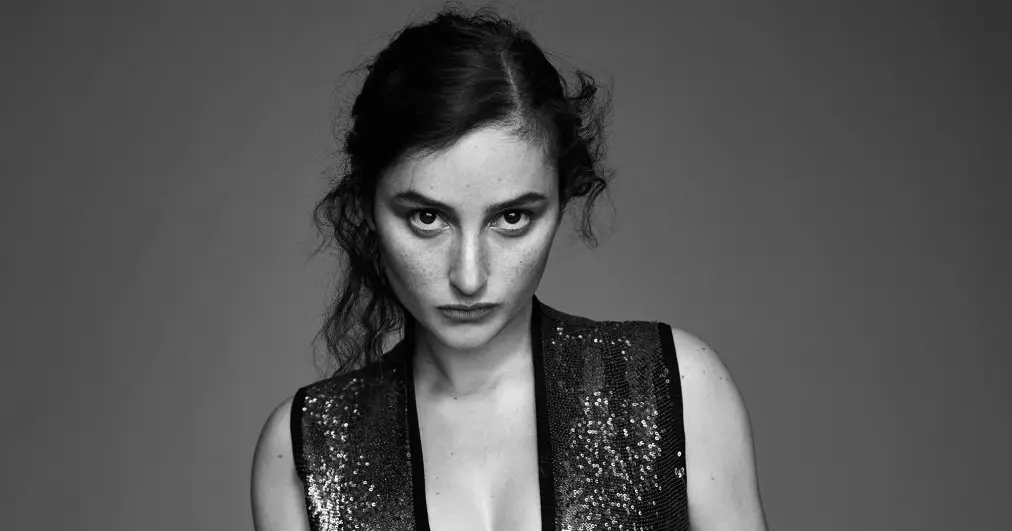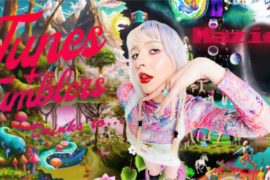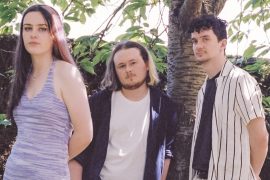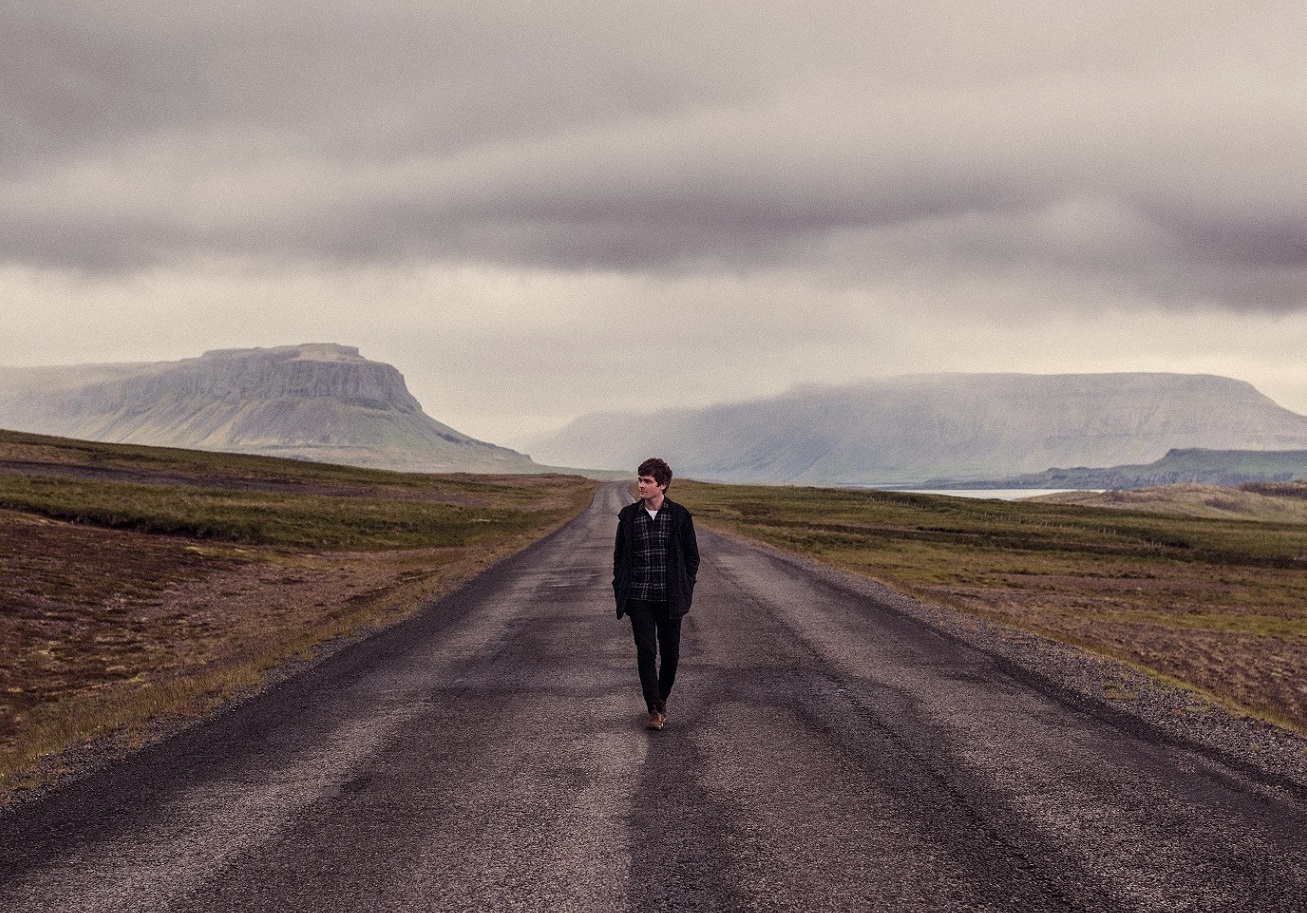2016 has already been a full year for Sleepy Kitty, an indie rock band based out of St. Louis. They went on tour with Ezra Furman, released a new EP, were voted “Best Indie Rock” by the Riverfront Times in St. Louis, went on tour again, and in the meantime have been working on new music and art projects.
Both musicians and artists, Paige Brubeck (vocals, guitar) and Evan Sult (drums) have created an indie band that spans eras with its melodic harmonies. You can hear the art pouring from their music and lyrics, and by proxy, their souls.
This past June, Sleepy Kitty released a short collection of work, an EP called FLUX. In 8 songs and 14 minutes, Sleepy Kitty bring the listener into their world with on-location tapes, demos, guitar solos, and thoughtful, personal songs that question the way society behaves.
Listen: FLUX [EP] – Sleepy Kitty
[bandcamp width=100% height=120 album=553720662 size=large bgcol=ffffff linkcol=0687f5 tracklist=false artwork=small]A CONVERSATION WITH SLEEPY KITTY
Atwood Magazine: What I get from the title FLUX, is that it is a shift in your music, of seasons, and a shift in society in general. Is that what you were going for with the name - what compelled you to name the EP that?
PAIGE: Absolutely, all of the above I’d say. Our street has changed a lot and our building is actually changing a lot—there’s been a lot of construction in the building we’ve been in—and our neighborhood has had a lot of new places pop up. And I feel like our band is kind of doing different things. A lot of these songs came from in the van and onstage as a two-piece with the kind of basement rock-vibe. I think for us it was kind of a different approach than the studio where we are laying out a bunch of harmonies and extra tracks. For us it was kind of capturing a transition as a band and as a transition in our neighborhood and what our band is supposed to do next. I was hearing about spending habits of Millennials on NPR and thinking about how people in their 20s and early 30s now aren’t buying cars and houses as much and I was like, that’s me! I don’t have those things. Evan and I haven’t really wanted those things yet or we haven’t found a way to want those things that would make sense yet. So “Summer” is kind of about that and kind of being like, “I don’t know what the future holds.”
EVAN: But I do know that we’re going on tour!
PAIGE: We are going on tour! We do know we want to work on the band—we know that’s what we want right now.
How have people been reacting to your new music?
PAIGE: So far the response has been good. We released a video for the song “Summer” that we shot on the street ourselves, and that’s been getting a really good response from a lot of friends and people that are in the scene. There are a lot of our friends and neighbors in the video because a lot of it is shot on Cherokee Street during a very busy weekend. The songs themselves are really great to play live when we’ve been on tour—just getting to play them again and again and get them out and have a really different set.
EVAN: The EP has been doing really well—I mean it helps to have a song about summer in the summertime. As a note to ourselves to keep doing things that, because it feels great to talk about the summer when you’re practically celebrating it by going out on tour.
For us it was kind of capturing a transition as a band and as a transition in our neighborhood and what our band is supposed to do next.
Did you guys know what you wanted the EP to sound like when you started, or did it kind of come along randomly?
PAIGE: It came together kind of by surprise and then kind of naturally. We’ve been working on a lot of these songs for a while and getting in the studio whenever we could and writing while we were on the road for Projection Room [their latest LP]. We’d be home for a few weeks, then get in the studio and go out on tour again. So a lot of these songs kind of came one or two at a time, here and there. Some were literally written in the van on tour. We weren’t necessarily even thinking about it as a body of work, we were just thinking about it as writing new songs. I was working on music one night and listening to old recordings and demos and just listened to a bunch of tracks we had been working on. [Evan] came home and I had put together a sequence that I proposed would be our EP. I think that without even intending to write the next thing, this body of work at this time, kind of post-Projection Room time, was actually its own sound. Some of the songs we thought were demos, while we were listening to them again, we were like, actually I don’t want to do this again. This is the version of this song. There’s not a good reason to go in the studio and do it again. We’ve already done the version this needs to be. It became kind of a document of that time and of the process of the songwriting itself.
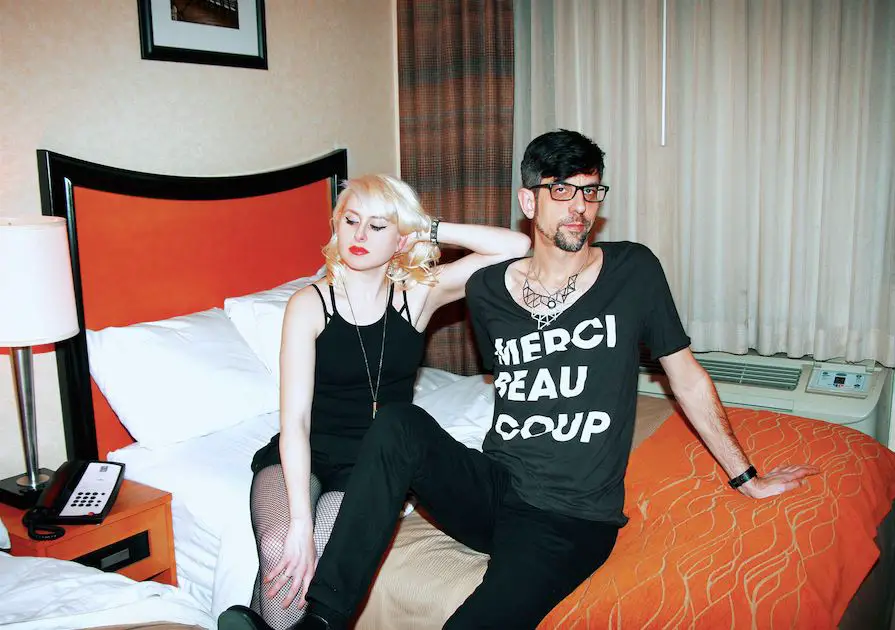
The EP in general is fairly short; it's only 8 songs and lots of them are kind of shorter instrumentals. It reminded me a little bit of your LP Infinity City with all the location sounds that were on that. What is the process like for creating one of those on location songs?
EVAN: Those are sometimes a slice of practice space life. We try and collect those moments where we’re working stuff out or where a certain guitar pedal and guitar part combination become something exciting. In our previous bands, in our Chicago bands, we both would carry around recording devices and kind of build the environment into our songs — very consciously in those bands — capturing sounds of our city. And actually in Sleepy Kitty’s very first incarnations, like one of our very first songs, we used the voice of the night watchman at our practice space as the vocals of the song.
PAIGE: Just like a conversation kind of cut up interview style, and then just taking phrases and repeating them and doing harmonies to them.
EVAN: And he was an unusually amazing character. But we’ve always kind of had our recording devices out. We’ve kind of got a library of moments we’ve experienced and that we can then layer one on top another to let the listener in on the world that we’re walking through and what it sounds like. I think of it as kind of mysterious and informal at the same time.
PAIGE: Also I’ll add to that, so our very first pieces that we made were like longer form collage pieces that don’t sound recognizably like the Sleepy Kitty of today. The kind of first official release we did was called What I Learned this Summer, which we have on our Bandcamp. I feel like FLUX was a checking in on that style and process again. There are a couple songs that have the practice-space and collage-y type of stuff. I feel like FLUX was part 2 of What I Learned this Summer. It’s like what I learned this summer!
We both would carry around recording devices and kind of build the environment into our songs… capturing sounds of our city.
I have to ask: Is the song “I am Jack’s Midwestern Dream” a Fight Club reference?
PAIGE: I would say indirectly it is. There’s a bar on our street called Fortune Teller Bar that we love–it’s one of our favorite places to go. There’s a tiny little bathroom there–I feel like it’s photo booth-sized. It has wood paneling and it looks like, you know, classic dive bar. And it has a ton of graffiti and a lot of tags and drawings and stuff. But somebody has written in huge letters, “I am Jack’s Midwestern Dream” and drawn like this little character. It’s in this very prominent place and you always see it when you close the door in this tiny dive bar bathroom. So it just stuck out as a phrase to me, and we’re kind of always looking for phrases to title things. And I totally forgot that that’s Fight Club. I was like what is that? Whatever it is, it sounds great! And so we named our song that little snippet, and somebody asked if that’s Fight Club, and we were like ahhhh yeah–that’s cool, I like that movie!
EVAN: Originally just like a neighborhood call-out, turns out to be a movie call-out.
Watch: “I Am Jack’s Midwestern Dream” – Sleepy Kitty
[youtube=https://youtu.be/DFcdRxJGOo4?t=0s]
You guys are heavily influenced by cities and different places you travel — in your opinion, what makes or breaks a city?
PAIGE: I love public transportation because I hate driving. Whenever we get to a place where we don’t have to drive and we can park the van and just be there and walk around and take the train or the bus if we need to, I love that. That’s what I miss about Chicago most, I mean there are lots of things I miss, but the public transit we use all the time.
EVAN: The effectiveness of a bike in Chicago.
PAIGE: Yeah. I love that. And in New York City, we love how easy it is to get around once you park the van…once you find parking for the van. I think that there’s so many cities that I love and they’re all so different. I love seeing the different architectural styles. Cincinnati is one that we go to a lot that looks kinds of like the gateway to the East. It’s very East coast-looking and very dense downtown. The buildings are all color and have fire escapes on the front, but it still feels kind of Mid-West as well.
EVAN: I feel like we are really open to cities when we are travelling around because we’re just the two of us…there’s not a lot of band mates who need to be fed or need to have this or that issue that they’re trying to resolve…which happens quickly when you’re touring around. We can just kind of look for things that we already know we like. We’re both vegetarians so we like to find the best vegetarian food around and get invested in that. Or find something unusual about the city that draws us in. It sometimes feels like cities are flirting with us. Recently we were driving from the East coast into Pittsburgh and we came through a mountain tunnel and out around the corner and the sun was setting over Pittsburgh and you could see just the entire city bathed in gold. It was just incredible. It’s a beautiful city and it’s full of weird stuff, not unlike St. Louis in some ways, but we had good people experiences and you really feel a city calling out to you and saying like, what about here? Look at what this world is. I think the easiest fantasy is that you never stop touring. You get to be familiar with a dozen cities.
Where’s one city in the entire world where you haven’t played, but is number one on your bucket list?
PAIGE: I would say for me, Berlin. Never been there. I’ve been to Germany but I’ve never been to Berlin.
EVAN: Berlin, definitely. I’ve been to Rome but I’ve never played Rome, and I would love to play Rome. That and Tokyo. I’m not so into being a tourist, I’d rather be on tour. I’d rather be doing something and having a function in which I’m interacting with the city when travelling. Most of fantasies of travel do involve the band. That’s the way to experience it. That’s the way to find the subculture that I’d be looking for anyway.
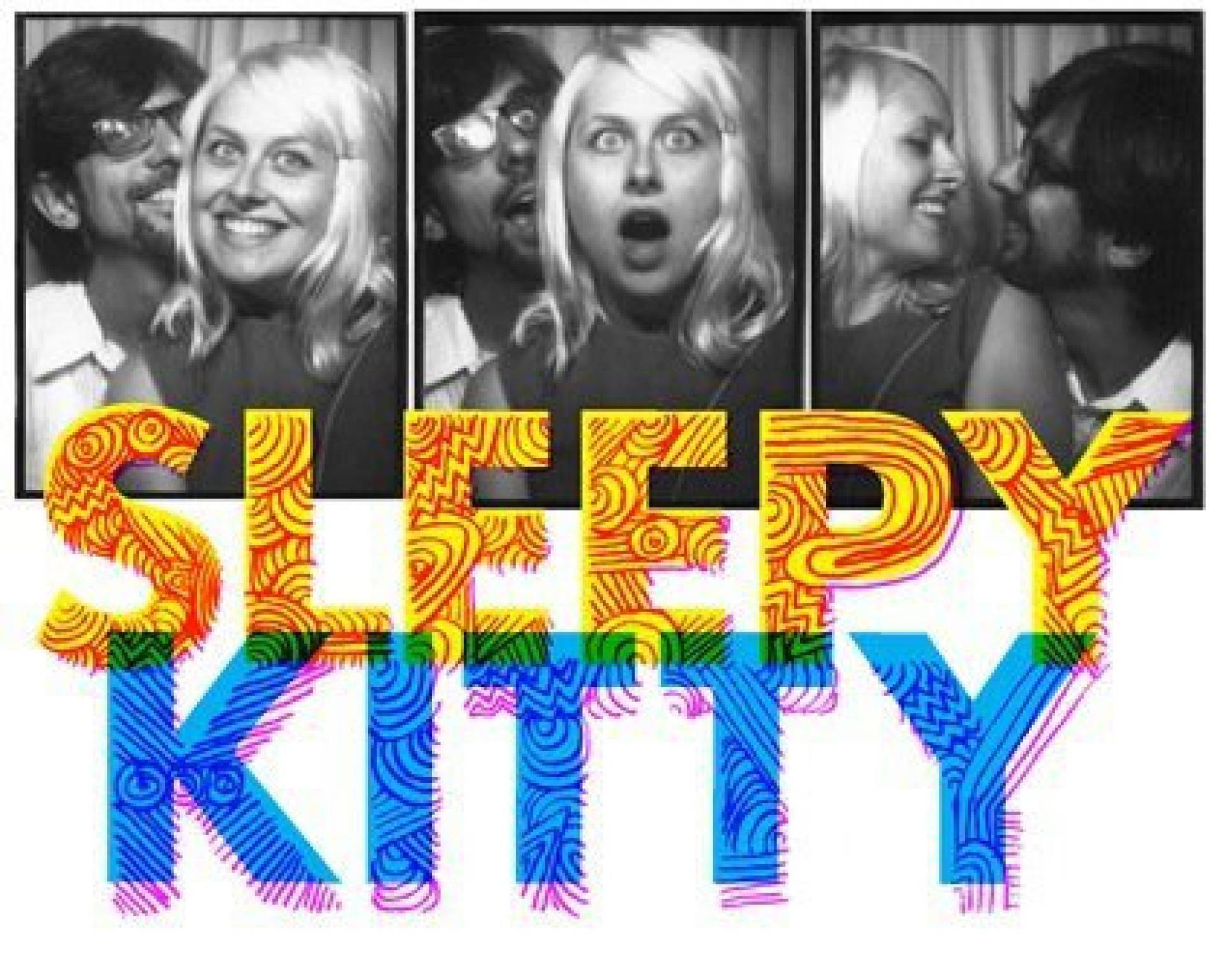
So “Math Class is Tough” — It’s about a Barbie Doll who said just that: math class is tough. What made you want to write a song about that? Did you personally have this Barbie Doll?
PAIGE: Yeah, I had that when I was kid, so I guess I was like second grade or first grade, it was like ‘91 or ‘92. I agreed — I thought math class was tough and I thought there was nothing wrong with that. Personally I loved Barbie Dolls when I was a kid and I thought there was nothing wrong that she would say that. I thought it was weird when all these people, all these adults, were saying, hey you can’t have a doll say this; it’s like corrupting the children or whatever. And I was like why do they think I’m so stupid? That like I’m not going to also see Barbie is an astronaut and a doctor…I remember feeling really weird like having a doll I thought was hilarious and me and my friends…were laughing and cracking up you know when pushing this button and hearing all these things it said, and just laughing when it said math class is tough. I didn’t like having adults say oh my god kids can’t have this. I was like what, that doesn’t make any sense. And yeah, I didn’t like math, but I’ve had math teachers that helped me do what I needed to do. I also did a lot of science in junior high and high school and I really like that…I’ve always been interested in science. To me like, having some adults say this is going to like make me not interested in math and science at all is just like, it was offensive to me as a kid in this way I kind of couldn’t put a finger on but I had this like weird feeling about it. And then as an adult telling Evan this story, you know just like this kind of weird childhood memory that’s been buried down in who I am, it’s like the whole song came out and I was able to articulate what I couldn’t then.
EVAN: 20 years later.
PAIGE: And yeah, it’s a weird experience to have this thing you’re feeling as a kid but adults are telling you how to feel a different way.
EVAN: I will say too that it has been very funny to me to see Paige kind of picking up an argument that nobody has been arguing for
PAIGE: For like 25 years ha.
EVAN: She’s like really reaching back into the past for something that just hasn’t been an issue or a reason for it to be an issue. But when she does, it’s really important how we set the song up, because it still does provoke strong responses, especially from women who were feeling belittled at that time.
PAIGE: People who are my age and younger, I feel like relate. But I’ve had more pushback from feminists who are like maybe 10 years plus older than me.
EVAN: Second wave feminists.
PAIGE: Yeah.
EVAN: Which has been interesting too, because we are not obviously claiming that women are bad at math or shouldn’t be doing math or something, but that’s how it was taken at the time and it was really offensive to some people. We’re not trying to tell them they were wrong to feel that way back then, we’re just trying to present I think one young girl’s alternate perspective. But it’s weird because it’s way later.
You add lots of activism with your music, whether be for this song or others. I know you guys are really heavy into politics. Did politics shape FLUX in any way? What does it have to do with how you create the art that you put out?
PAIGE: Hmm that’s interesting. I would say that especially around right now, if I didn’t say politics was a huge influence on every waking moment of my life, Evan would laugh. As Sleepy Kitty, we did a fundraiser, like a very DIY show where all the money went to Obama in 2012, and we did the same with Bernie Sanders in January of this year. And so we are really enthusiastic about throwing our weight and our voice and whatever power we do have as a band playing music today that how many ever people know about. We’re really game to throw that behind candidates we think are important and causes we think are important. I would say it’s definitely been a big part of that, like doing our fundraiser type shows, but also it is creeping more and more into the music. I will say, the song “Elder Chels,” which is on our EP What I Learned this Summer, the one on our Bandcamp, that was about the 2008 primary and I feel like “Math Class is Tough” is kind of political. Actually some of the newer, like very new songs we’ve written in the last month or two, are kind of about the primary season. Some are kind of veiled, like you wouldn’t know it, you’d think it was a breakup song or something.
EVAN: I will say, I do think we do split our personalities a little bit in that you know when we are expressing ourselves in terms of ourselves we can be very opinionated. We do think of Sleepy Kitty as a place and an opportunity for inclusive thinking and inclusive talk and largely positive. Plenty of our songs no matter what are kind of critical of a person or a moment or a thing. The identity of our band is as a place of welcoming.
PAIGE: Yeah, we’re a welcoming and open discussion place.
EVAN: We’re not necessarily speaking for more people than ourselves; we’re talking about our strange take on things.
PAIGE: Yeah and more like details that aren’t being discussed and like personal feelings about things rather than declarative feelings about things. I do think that it is important that Sleepy Kitty is a welcoming place to all ways of thought. I mean there are people we meet where we come from completely different backgrounds and completely different politics and we all love rock and roll.
EVAN: It definitely is a part of our lives and part of our music. But we try to close it in a human relationship context when we’re doing it from the band. When I’m writing a thing on Facebook, that might be a little different story. What Sleepy Kitty says on Facebook is just going to have different content than what Evan Sult says on Facebook on his own page. That’s a distinction we make so that we can speak freely, but also not have our band necessarily contain all our loud opinions.
PAIGE: We’re not afraid to embrace our politics, but I don’t want to alienate someone who doesn’t have those politics either.
EVAN: Which you know is hopefully for the greater good down the road as somebody who had different political feelings than us but is sympathetic to our songs. The more they get invested in our band, the more likely it is we can show them our perspective, instead of forcing them to decide about our perspective.
We’re not afraid to embrace our politics, but I don’t want to alienate someone who doesn’t have those politics either.
Apart from your music, you do a lot of multimedia art, screen-printing, things like that. How does your art and your music bounce off of each other? Did one come before the other?
PAIGE: They kind of all started at the same time for us, actually. Sleepy Kitty Arts came from us doing posters for our separate bands and also just making t-shirts and doing designs we thought were fun for our own projects. I feel like for me they’ve always been interwoven. Actually my last semester at art school I was taking a screen-printing class because I had never actually taken a class and I figured I might as well take advantage of being enrolled in art school and learn the quote right way to do this. My TA asked me, do you want to do anything that’s not posters for your band? And it had not even occurred to me that I could do that. But yeah, for us posters was a really natural thing to come out of playing music. It does, I feel like, influence the music as well. Sometimes working on art stuff and working on our sketchbooks…I’ll be kind of zoning out on that and it’ll make me want to work on music. It’s always kind of bouncing back and forth. I’ll have a very productive time of working on music and then I’ll just want to work on design and sketchbook stuff. Evan’s been on a roll lately with some amazing posters.
EVAN: I discovered the meaning of music, to me, in college. I loved it before that and I liked rocking out, but it wasn’t until college that I heard music that I really related to, and it was just kind of an explosion of great things. I learned about great bands and I learned about gig posters and about writing about music all at the same time. My first band all met at the school paper and so we were taking photos of bands and going to see bands and writing them up and doing posters for our own band. So they’ve always kind of been the same thing. I think as long as either Paige or I are in a band we’ll be doing the graphics of it. And then it’s really fun to do it for other bands. We’ll do album art for a band and they give us music and we spend a lot of time listening to it and thinking about the words of it and the sound of it and then we come up with something. No matter how open they think they are, they’re always going to be surprised by our interpretation of their music. Being able to interpret a band back to themselves I think is one of the real joys of being in a music community and being a graphic artist—a graphic person in an audio field. For our band and for other bands, the graphic version of things is as interesting as the audio versions. They have tons of overlap. What we call schmutz — the grainy things in our posters — is often directly related to the amount of distortion in the song and the band or whatever. Or the colors that you chose are related to the kind of sounds that they use and stuff like that…Time has gone on since I was seeing posters in the 90s in Seattle, they really did advertise shows and you really did find them on telephone poles and stuff. That doesn’t happen so much anymore in real life. People still make posters but they sell them at shows and things, which is fine, but I do feel like those things that are part of the history of rock culture, the multimedia history of rock culture, are really important. They’re part of what makes it a rich experience, what makes it more than just a bunch of sounds. It’s not just that Jimi Hendrix was playing a guitar, it’s that he was playing guitar around a certain kind of people at a certain time and we remember the photos of him and we remember the posters of his shows, we remember what people were wearing. I mean that stuff it does all have significance. All of that is rock music, or whatever genre, our genre is broadly speaking, rock. I feel like hip-hop has a really good understanding of that. You know there’s a unity to graphics—the style of dance to the clothing and hip-hop as a way of life. When you talk about rock and roll life that’s not necessarily the thing that I mean. Drugs and sex and rock and roll and all that stuff. There is a rock thing that is more central than that and I think it’s the many forms in which the ethical component of punk or rock or a kind of self-determined life is reflected in the art that you make to support your music. The things that you say, the clothes that you wear—it’s all part of the big project.
What we call schmutz — the grainy things in our posters — is often directly related to the amount of distortion in the song and the band or whatever.
Aside from doing posters for your shows, you use your art for a lot of your music videos, “Don’t You Start” as an example, and then “Summer” most recently. I’m curious, how long does that process take?
PAIGE: “Don’t You Start” took, um…
EVAN: Forever.
PAIGE: …a really long amount of time. Like so long I don’t even want to say it. I will say as a warning to anyone who thinks that it’s not gonna take long to do a hand screen-printed animation video, set aside a long time. “Don’t You Start” was the one that, when I first told Evan I was picturing doing this animated screen-printing thing, he was like that’s crazy. And I’m like, no, it’s gonna be awesome! So I did the first 10 seconds and that was from our chorus and Evan was like, OK, that was awesome. So we both jumped into it and then realized that being a 5-minute song we should probably put some other things in it. So we got our friend, Bill Streeter, involved. He shot some footage of us in our studio and I think it actually turned out a lot better to have the process of the screen-printing in it, because a lot of people haven’t seen that done. Even if they have they didn’t quite realize we’re literally making an animation by printing it and shooting it. I think that made the video a lot stronger once we did this thing, kind of by necessity. But it actually helped the content and the actual video itself.
Watch: “Summer” – Sleepy Kitty
[youtube=https://youtu.be/2Oj7I-FBZUU?t=0s]
EVAN: I think one of the things that we learned with this band is that it’s kind of most inherently interesting if you show the process in some way. You do the thing that you are most fascinated by. The screen-printed animation was kind of the most challenging thing that we could come up with. Right now we’re actually working on a video for “Math Class is Tough” that is very daunting in its own way. We’ve been building a set that is a Barbie dream-house.
PAIGE: We’re taking advantage of having a workspace with high ceilings.
EVAN: No matter what we do we are underestimating the time it is going to end up taking. Especially if you’re not going through the big, major label, high in the sky fantasy that doesn’t even really exist anymore, the next up fantasy is to do all the stuff that you want to do and have a reason to do it. That’s what being in an independent band right now is. If you just put all your creative energy you use in whatever format and just put your band-name on it, that’s how you end up getting a bunch of stuff done you wouldn’t get done otherwise. That’s my working theory.
That reminds me of the video you guys shot for your cover of “Summertime,” but with you Paige using a loop medal, which not a lot of people realize you loop your voice. It was really interesting seeing what you guys do to make your music?
PAIGE: I think sometimes for me I forget that the process is a part of it and is interesting, especially the loop, which a lot of times I’m just trying to get to the next part as fast as I can and trying to get to where you hear all the parts. And Evan is the one that’s like, it’s actually cool that we loop things on stage; some people think that part’s interesting. I’ve just been a part of the process so long I forget to actually take a moment and look at that as a part of the style of the band. Evan is the one that has reminded us that it’s not only part of our aesthetic, but it’s even potentially a good part of the aesthetic.
I definitely say so. Even just being a two-piece band - there’s not a lot of them - and if they are, they don’t tour as two pieces. I think that’s definitely something of your aesthetic - just the process of how you create that full sound with just two people both in studio and live.
EVAN: Yeah, that’s kind of been an ongoing question in the band, I think. There’s the value of that and there’s kind of you, you get an album done and then you’re like, okay, we didn’t worry about how we were gonna make this live. Now, how are we gonna make this live? You know, there’s a bunch of guitars on it and a bunch of voices on it and a bunch of keyboards on it and stuff, and you gotta kinda figure what stays and what gets incorporated into amalgamated parts. And sometimes you’re like, OR we could solve this problem the way it’s been solved since the beginning of rock and roll and get a bass player…who sings harmonies! We’re kinda always considering that direction, although there’s something challenging about solving a problem with just not enough parts that I think is not just interesting to do, but interesting to see.
PAIGE: Well I think it’s like theatre a lot of the time. Some of the most amazing things I’ve seen have been when there’s a huge cast all singing and this big amazing set onstage, and some of the other most amazing things I’ve seen have been when there’s one person on a black box theatre stage, and everything in-between. I think that there’s always a good reason for solving things a variety of ways and just figuring out which is the best way to do it with the project at hand.
What’s up next for Sleepy Kitty? I know you said you’re working on a couple new songs, are you conceptualizing an album at all?
PAIGE: We don’t have official plans for the next album yet, but we are writing new music that we are very excited about.
EVAN: We’re finding out about our album.
PAIGE: Yeah. FLUX just came out last month so we’re kind of at the first part where we can actually start thinking about what would be next. We’re pretty excited about that. Also, we have a lot going on this summer. We’re playing at Riot Fest in Chicago, which we’re very excited about. That’ll be our first time at that festival and it will be good to get to Chicago again. We’re playing that and hopefully going to play some music off FLUX there and maybe a couple brand new ones, too. We’re also working on some videos in the meantime for FLUX.
EVAN: We are very much in flux right now. It’s a good place to be when you’re making an album…I mean it would be fine if we also felt like, “I know exactly what I want to say!” But right now we’re finding our message and finding our songs. It does feel like the floodgates are starting to crack open though. Paige is having a hard time sleeping with all the lyrics in her head, so that’s generally a good sign.
Connect with Sleepy Kitty on Facebook, Twitter, Instagram
Discover more new music on Atwood’s Picks
Cover: Sleepy Kitty © Mr. Iozo

